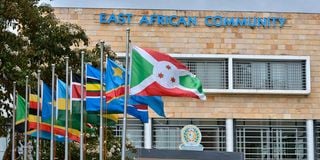Premium
What EAC stands to benefit from a single currency

The East African Community Headquarters in Arusha, Tanzania.
What you need to know:
- The success of this initiative will be accredited to the magnitude of convergence and homogeneity of member states.
- The currency should also be used as an apparatus to maximise single market benefits, trade policy and political cooperation.
The creation of the East African Community (EAC) was motivated by the European single currency experience, to easily account for the regional bloc’s economic and monetary integration.
The envisioned currency will replace national currencies and, just like the euro, create an efficient way for member states to do business.
The success of this initiative will be accredited to the magnitude of convergence and homogeneity of member states. Thus the need for an effective economic and monetary integration strategy that will support the merger of member states’ economies into an EAC Economic Community with a single currency and controlled under an EAC Central Bank. However, substantial political and economic consequences might emanate from the integration.
Exchange rate fluctuation costs
Somalia is one of the most disadvantaged economies in the region. Although it has an official currency, the Somali shilling, the US dollar has taken precedence over the local currency.
The unified currency will benefit citizens, businesses and the economy of Somalia in many ways. It will stabilise regional prices; ease comparison of prices between states; make buying and selling within the bloc and globally much easier, cheaper and safer; boost economic stability and growth; increase influence on global economy; be a tangible sign of the EAC identity; and, lastly, offer more efficient financial markets.
Besides, the currency will eradicate exchange rate fluctuation costs within the bloc. That will shield businesses and consumers from the costly swings in currency markets that might undermine confidence, cause economic instability and discourage investment in some states.
Economic stability and growth
More so, however small, the single currency will create new opportunities in the global economy. It will encourage non-EAC states to trade with the bloc, promoting trade and investment. If judiciously managed, it will also be an attractive reserve currency for non-EAC states, hence strengthening the bloc in the global economy.
Similarly, the stability of the currency will make it attractive for global businesses to trade with the bloc. It will even allow price quotations in the currency to reduce over-reliance on superior currencies, saving regional businesses from costs of exchange rate shifts and conversion of EAC currency to other currencies. Lastly, the currency will ensure economic stability in the EAC. That will make the bloc more resilient to external economic shocks.
However, these benefits will best be achieved through prudent management, whereby the EAC's economic and fiscal rules boost economic stability and growth. The currency should also be used as an apparatus to maximise single market benefits, trade policy and political cooperation, thus forming an integral part of the EAC’s economic, social and current political structures.
Mr Awil, an international relations expert, was Federal Republic of Somalia Ambassador Extraordinary and Plenipotentiary to the People’s Republic of China. [email protected]. @m_amb





